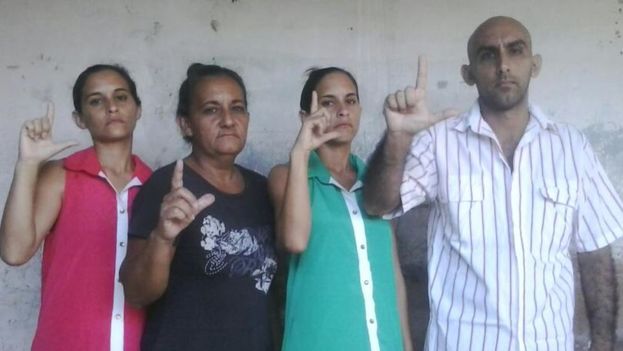
![]() 14ymedio, Havana, 3 April 2017 — The three Holguin siblings who had been on hunger strike since last March 7 were released on Sunday on parole, according to what their mother, Maydolys Leyva, told this newspaper.
14ymedio, Havana, 3 April 2017 — The three Holguin siblings who had been on hunger strike since last March 7 were released on Sunday on parole, according to what their mother, Maydolys Leyva, told this newspaper.
The activists Anairis Miranda, Adairis Miranda and Fidel Batista were sentenced were sentenced to one year in prison for the alleged crimes of “defamation of heroes and martyrs” and “public disorder” during the days of national mourning after the death of former President Fidel Castro last 25 November.
This Sunday, Leyva visited two of her children who had been admitted to the Vladimir Ilyich Lenin in the provincial capital city of Holguin, where she learned the news of their release. Shortly afterwards, she went to Clínica Quirúrgico Lucía Iñiguez hospital to visit her other daughter, Adairis Miranda, who had also been given parole papers, according to her mother.
At the moment Adairis and Fidel are receiving a treatment with sera as part of their recovery therapy after more than three weeks without eating. A doctor explained to Leyva that the treatment will last “between three and four days” before they can return home.
Anairis, who has a heart disease, is in “a more serious state of health, at risk for his life,” her mother explains to ’14ymedio’
Anairis, however, is in “a more serious state of health with her life at risk,” her mother explains to 14ymedio, so the doctors believe the recovery process will take longer. The young woman, her mother says, “has heart disease.”
Leyva conveyed words or thanks to other activists, the independent press, and the international community, “who have been aware of the lives of my children… and have not let them die.”
Parole is a condition frequently used by the government to release its political opponents. The former prisoners of the Black Spring who still live in Cuba are under that legal condition, so they can be returned to prison whenever the authorities decide. Also, they cannot travel outside the country.
Last Friday Amnesty International urged the Cuban government to provide medical care with guarantees to the siblings and cataloged them as “prisoners of conscience.”
